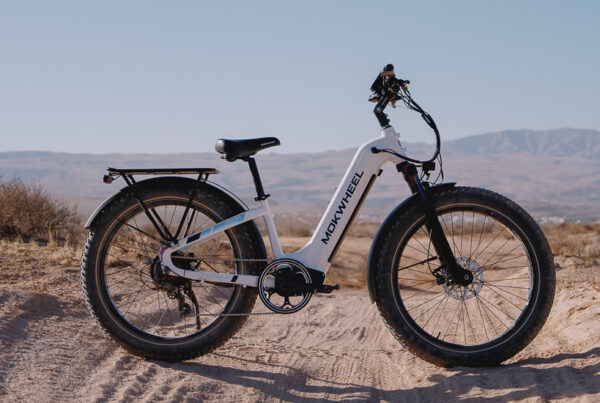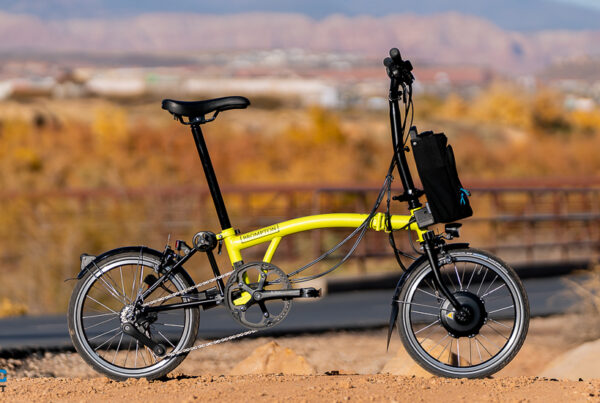Harley Davidson decided to commission a line of electric bicycles a while ago, and I decided it was about time to write about them. A few years ago, they designed an electric motorcycle that they called the “Live Wire” and it was styled as a heavy road cruiser, similar to their main product line. I’m sure they felt they understood that market, but they have also behaved in a way that revealed they understood that they would be fighting an uphill battle when it comes to EV’s.
Everything in their research data showed that most of their customers are older, and that for them to grow over the next decade or two, they would need to appeal to a younger audience. They had previously designed a gasser sportbike called the V-Rod, with an engine designed by Porsche, to address the concerns that Harleys are not nimble or quick. It “did” appeal to some younger riders, but it has not sold in the numbers they wanted, to reach their goals.
Harley spent a ton of money promoting their new electric motorcycle called the “Live Wire”, and yet, it too did not sell well, or to a younger set of riders. The styling appealed to the older set, but the older riders generally wanted to stick with Harley’s gas engines. This year, they dramatically changed the styling of the Live Wire, and also changed the physical design.
The first version had a longish cylindrical motor at the bottom of the frame, running length-wise. It drove a 90-degree gearbox to convert the shaft to driving a belt that ran back to the rear wheel. In the pic below, you can see the new model has switched to a traverse motor-shaft, and a direct belt from the motor to the wheel.
The 2022 Live Wire, from Harley Davidson
I’m going through some background to help our readers understand some of Harley’s ebike choices. The goal for them is to show 20-somethings that a Harley ebike or electric motorcycle is something they should consider. Something Harley has been successful at in the past is marketing the Harley “lifestyle”, but…they have only been successful marketing to men in their 40’s and 50’s. It remains to be seen if they can convince young adults to pay a premium for the Harley name.
_______________________________________________
Serial-1 Ebikes
Harley is still trying to figure out how “connected” they want to be to their electric bikes. They don’t want to alienate their older core customers, because serving them has been very profitable. But somehow, they want to figure out how to also appeal to 20-somethings…
This reminds me of a time when the Toyota brand name was highly respected among middle-class car buyers, but their luxury models were not selling to their intended potential customers. Toyota created a new brand, called “Lexus”. The advertising and marketing were directed at upscale buyers, and it was a success. Harley is trying out the same trick, by forming a new “independent” company for electric bikes called “Serial 1”.
One piece of good news is that these bikes are manufactured in Taiwan, which can be considered the “not communist” Chinese. They are made by Giant, who is a respected manufacturer, and known for producing a quality product. That being said, many Harley Davidson fans are heavily invested in the “Made in America” mantra.
In this next block, I’ll cover the items that are common to all of the four models. These are all “pedal assist” which means there is no hand throttle. This is a very European feature, and it leaves your hands completely free to concentrate on steering and operating the front and rear brakes. To be clear, if you want to get any power, you have to pedal.
These four models all use the well-known Gates belt drive. These run very quietly, and when moving the bike around, you won’t get any oil on your leg, the way you would with a chain. If you ride a lot, the chain would wear, and need to be replaced. I mention this because the belt system will initially cost more, but it lasts much longer. The cost of several chains over time would eventually equal having a belt. However, these ebikes are being marketed at upscale prices, so this is a feature that these types of customers would expect.
The frames are hydroformed aluminum, along with an aluminum fork. This has a major impact on keeping the weight of the bike low, which is a recurring theme as we’ll see below. The hydroforming allows attractive and creative shapes, instead of just using cylindrical tubing, and I like it. Style-wise, I would have preferred for the top-tube and the seat-stays to follow a single curve, like the cruiser-bicycles that are often found at beaches. Even so, they look good.
The rear brake cable and shifter cables run through the inside of the frame. I’m sure that is a pain for the manufacturers, but I like it, and if I was paying premium prices, I’d want that included.
The kick-stand is mounted near the rear, which I like. Its a small preference, but when I need to walk an ebike backwards in the garage, some drivetrains force the pedals to move, and with the kickstand moved back a little, there is no interference with the pedals hitting the kickstand.
The brakes are 4-piston calipers from TRP (Tektro). Both of them are large 203mm diameter discs. I highly approve of the front discs being these impressive units, but I would actually prefer the rear discs being a little smaller, maybe 180mm. When braking, the riders weight and the weight of the bike will lean forward, and this reduces the traction on the rear tire. This means that the rear tire is the one that is most likely to skid and begin sliding sideways.
The possibility exists that the caliper on the back is down-sized to even-out that reaction, but the PR spec-data doesn’t detail that. The brake “feel” at the handle is a hard thing to quantify, and I haven’t ridden these yet.
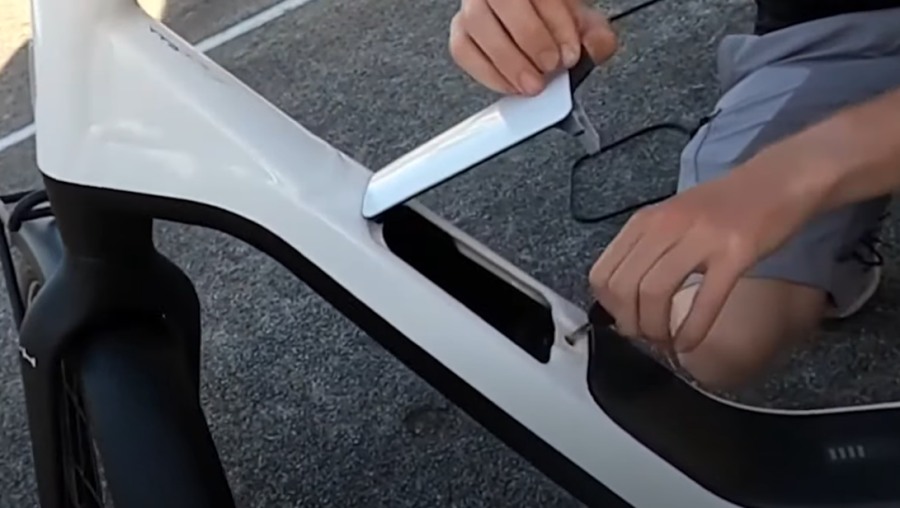
Serial-1 has included an in-frame storage compartment on all of these models. It is specifically shaped and sized to fit a common model of ABUS lock. Even if you use a different lock, it’s always nice to see a lockable storage compartment.
In the pic below, all of these models come with an “Elevated Stay” where the chain-stay passes above the drive-belt. I like this, and I’m glad to see more frames using it. Doing this avoids needing to include a “frame break” to allow the one-piece belt to be installed and taken off. However, even if I was managing a fleet of chain-driven rental ebikes, I would still want an elevated stay to make life easier on the mechanics.
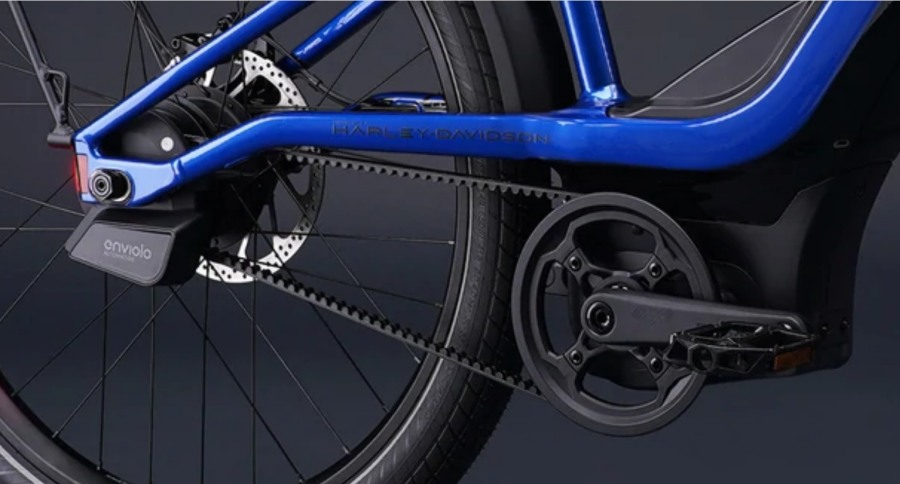
The wheels are all the 27.5 size, with a variety of tires listed below.
They all use the respected German “Brose” (BRO-suh) mid-drive, but I’ll get into that near the end.
_______________________________________________
Bash MTN
You can ignore the “Mountain” implication in the MTN name. This is a capable model, but it doesn’t have a front suspension fork for downhill, and it doesn’t have a rear suspension for jumps. Doing this keeps the bike lighter and simpler. The bars are narrow and flat, so I suppose this could be used as a gravel-bike, with the “semi offroad” tires that are 2.6 inches wide (mid fat?).
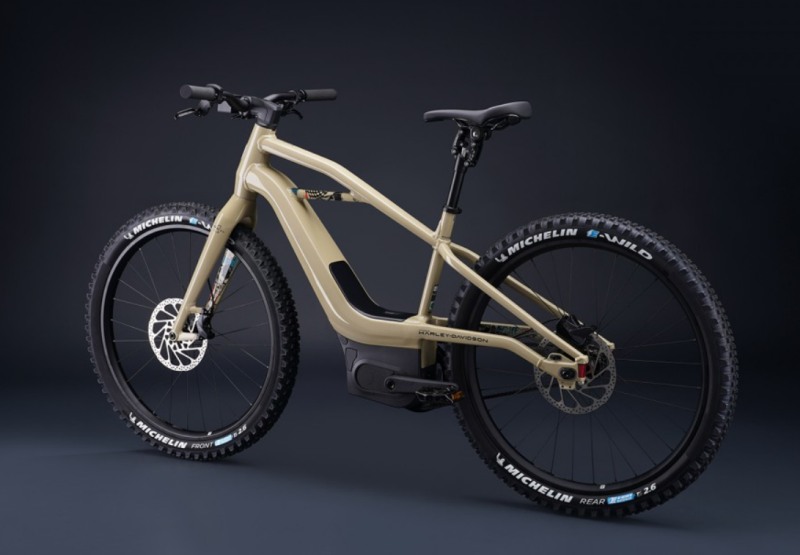
Gravel bikes are a phenomenon that started in the mid-west, where the terrain is relatively flat, but in order to limit to spread of a wild-fire, the counties have created a pattern of gravel roads that cross the countryside. The tread on this ebike is just smooth enough to be usable on streets, but it also just knobby enough to allow light off-road use.
Since none of these have a suspension, it’s interesting that this is the one model that they added a Suntour NCX seatpost to it. I have had a Thudbuster and also a Suntour NCX, and I can enthusiastically endorse either one. To see our article on suspension seat-posts, click here.
Using fattish tires and adding a suspension seatpost, does not create a proper “suspension”. However…that is what I have on my most-often used ebike, and I like it. One thing I like about the tires in this thickness range is that when a car tries to kill me, I can bail out over the street curb to get to the sidewalk, and it doesn’t damage the rim. My NCX seatpost also helps to take the jolts out of an unexpected pothole or an emergency curb-jump.
This model is a single-speed, and the drive unit provides a lot of wheel-torque up to 20-MPH, which is surprisingly modest, since the street limit is 28-MPH in the US, and there is no power limit when off-road on private property. However, there is an ongoing struggle between pedal-bicyclists and electric mountain-bikers concerning public trails, and the 20-MPH limit does address that for “future proofing” this model.
This model is available in four frame sizes, called S, M, L, and XL (no size numbers in inches or millimeters are published yet, so you’d need to test-ride one at a dealer to see what fits…which is what they want)
The drive unit is the “Brose S Mag”, and the published torque is a respectable 90-Nm/66 ft. lb. It is advertised as 250W continuous (which normally would be pathetic) but it actually not too bad, with the reasons for that being listed near the bottom of this article.
The retail price is listed as $3,999. Whether or not it is worth that to have the Harley Davidson name, is a question that only you can answer.
_______________________________________________
Rush City / Speed
Right up front I want to say that this is the model I would pick if you were paying for it, and I got it for free. The Brose “TF” model provides decent wheel-torque all the way up to 28-MPH, which is the legal street limit in the US, where I live.
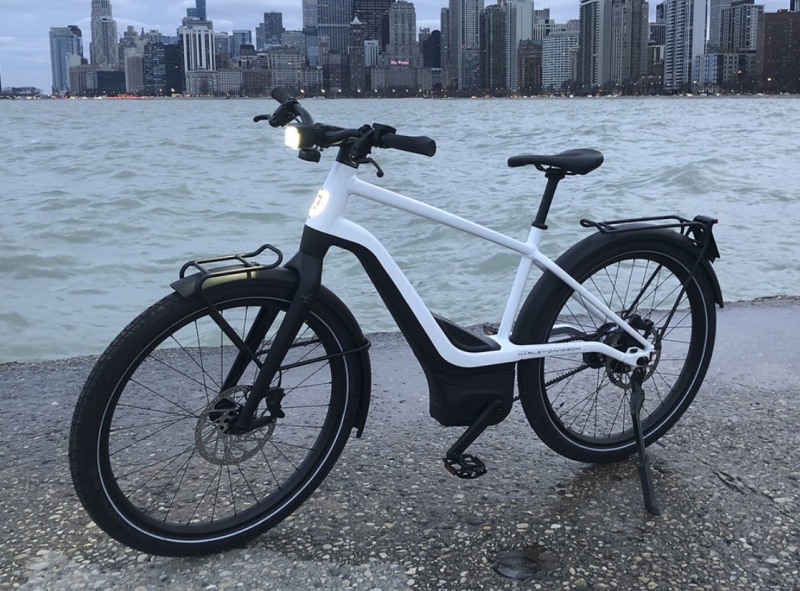
Upscale ebikes have a lot of details that are not obvious to the casual eye. Look at the head-badge in the picture above. The head-badge lights up, which is cool. The head-badge doesn’t provide much light to the trail, so there is an adequate headlight included on the handlebars. Lights are very important on a street ebike in order to be seen by car drivers, and any upscale ebike should have good lights that are cool looking, and integrated into the main battery.
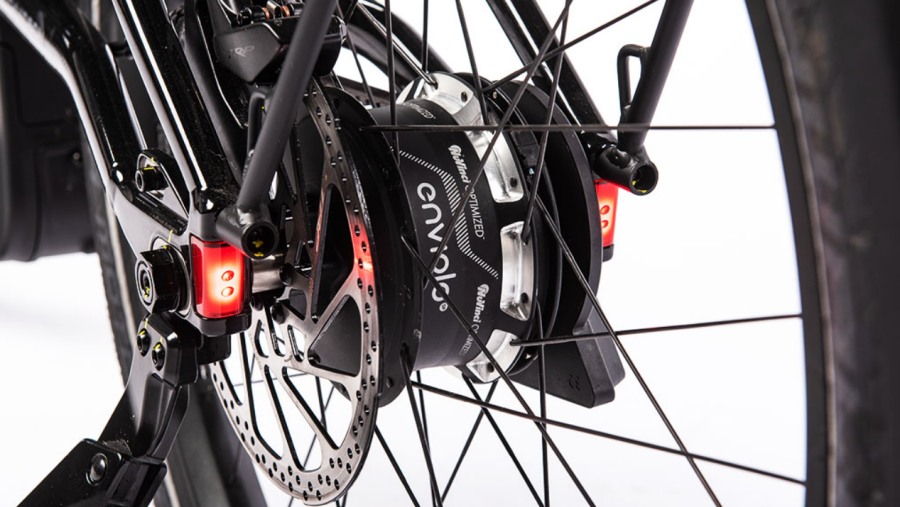
In the pic above, you can clearly see the tail-lights. I’d like it if they also added a single bright tail-light near the seat for better visibility. It would not be difficult to add one, and I’m surprised they didn’t.
There are two “Rush City” models (The step-thru is below), and they are the Serial-1 ebikes that have gears. The rear hub is the smooth-shifting Enviolo Automatiq “intelligent” auto-shifting CVT hub. The Intelligent part is that it has an app that allows you to use your smart-phone to tell you the gear-range you are in, your speed, etc…also, it senses speed and load and then selects the gear for you.
The Rush City / Speed has the larger 703 Watt-Hour battery (compared to 529-WH), so the range would be longer, but be aware that both battery sizes are interchangeable. The way to tell them apart is that the smaller one is “banana-shaped” to follow the curve of the frame, and the larger one has a bump on it to house the extra cells.
The Schwalbe street tires are a comfortable 2.4-inches wide for a smooth roll, and I approve of these. The price is an eye-opening $5,599 retail, you would need to really want the Harley name on your ebike pretty bad, since this is the Stromer ST2 ebike price range. More expensive than the ST1, but cheaper than the ST3.
_______________________________________________
Rush City Step-Thru
A step-thru frame is typically marketed to women, and since this model is only available in the three smaller sizes listed (S, M, L), then this one looks to be no exception. The colors that this model is available in are Serene Blue with a black under-trim, or Black on Black.

Other than the lack of a top-tube on the frame and the color options, the differences between the Rush City Step-Thru and the previous Rush City / Speed are that…this one comes stock with the smaller battery at 529-WH, it has the motor drive that caps added power at 20-MPH, and as a result, the price is $500 less than the Rush City / Speed at $4999.
_______________________________________________
Mosh City
The features of this model are a mix of the previously-seen features.

The color options are “Rowdy Blue” with black under-trim, or the black-on-black shown above. It uses the single-speed rear wheel like the Bash MTN, with the smaller 529-WH battery (lighter and less expensive).
It uses the fattest tires on any Serial-1 ebike at 2.8-inches, using a smooth-rolling street tread, and the drive unit caps the added power at 20-MPH.
To clarify, you can pedal as fast as you want, even past 30-MPH, but…if you want electric-assist power, this drive unit stops helping at 20. On the one hand, this does mean that using the pedal-assist-only system along with the speed cap will force you to have very good range, but…on the other hand…
This drive unit will make accelerating from a green light very easy, and it will help you tackle fairly steep hills as long as you pedal along. This is the most affordable of these four models at $3,799
_______________________________________________
Brose Drive Unit
Both of the Brose models used here have a magnesium housing for light weight. The difference between the TF and the S units is the top-speed, either 28-MPH for the TF, or 20-MPH for the S. Brose units with an aluminum housing were available, but Series-1 chose the more expensive magnesium shell to save weight.
They both provide a respectable 90-Nm/66 ft-lb of torque, which is very surprising since its advertised at a very modest 250W continuous. The way those clever Germans accomplished this was to make the rotor on this motor to spin at incredibly high RPM’s, and then find some way to package a gear reduction with a huge ratio.

There are two things about the pic above that I want you to take note of first. The motor configuration is an inrunner (the magnetic spinning rotor is in the center), with the hot outer stator being physically connected to the housing. This allows the housing to be a heat-sink, pulling the heat away from the motor and shedding it to the frame and the outside air.
The second thing to notice is that the side of the green circuit board of the controller that is facing us, has six shiny metal pads that would touch the inside of the housing once it it sealed up. You can’t see from this angle, but those are the mounts for the FETs on the other side, which control the motor. They are the hot part of a controller, and heat-sinking them to the housing is how it should be done. To see our article on understanding these 3-phase motors, click here.
Now, in the pic above, you can see that the motor drives a white plastic planetary gearset as the primary reduction. The gear-teeth are helical (angled) to help it run with less noise, and then the output of the planetaries drives a secondary reduction with a belt, seen below.
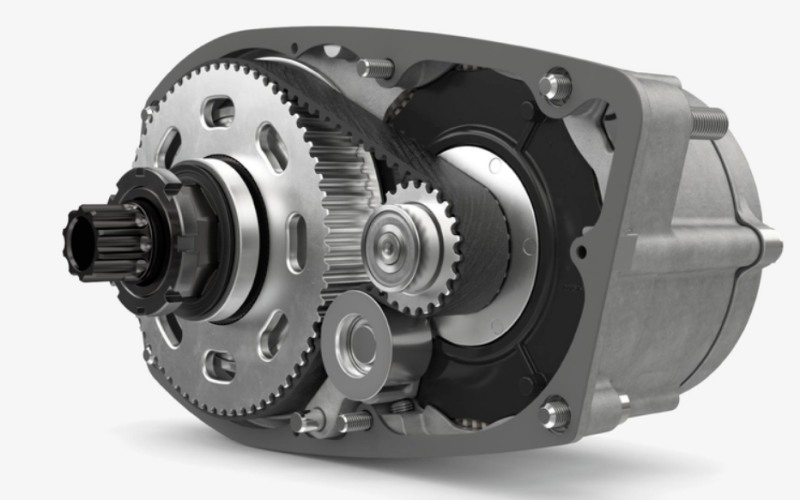
I don’t know the ratio of the planetary reduction, but the pulley teeth are 65T : 22T for a ratio of 2.95 : 1
Inside the larger pulley of the secondary reduction, the engineers located the freewheel for the unit. It is a more complex and expensive sprag-clutch, instead of the more common pawls. This makes it more expensive, but it also runs smoother and quieter.
The pedal mounts on the spindle uses ISIS splines, instead of the cheaper tapered square shanks. This is also an upscale feature, that allows stronger mountain-bike cranks to be used.
I’m glad to see from the tear-down video linked below that the rotor uses the Interior Permanent Magnet / IPM configuration. This allows the rotor to spin to VERY high RPM’s, while avoiding any risk of the magnets coming loose, or the magnets overheating due to eddy-currents (see our motor article by clicking here)
Here is a mechanic’s tear-down tutorial for overhauling a Brose motor
Here is a one-minute animation of the drive unit’s internals
_______________________________________________
Battery
None of the Serial-1 literature specifies the voltage of the battery, but the well-known Specialized Turbo Levo also uses this drive unit, and it runs at 48V (typically 13 cells in series or “13S”). If that’s true I approve. In the early days of ebikes, some manufacturers tried to save some money by using 36V, but…the more volts you use, the fewer amps you need to use in order to reach your specified power level. The amps are where the heat is generated, and heat is the enemy.
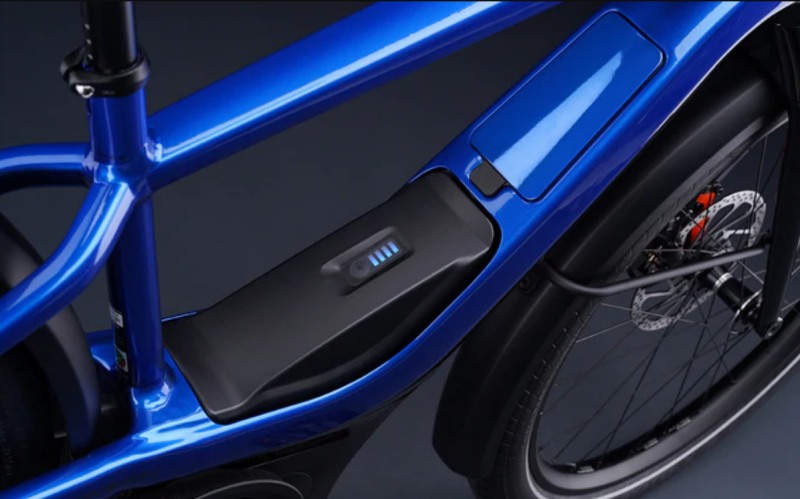
The Serial-1 battery pack comes in two sizes, and the one shown above is the larger 706 Watt-Hour. You can tell that by the bump in the center, instead of the housing being shaped like a banana to follow the curve of the frame.
If we divide 703 and 529 Watt-Hours by 48V, then the amp-hours end up at 14.6-Ah, and 11.0-Ah, which is respectable. The interior details are not provided, but…since this drive can provide high-torque from low input watts, the cells are likely high-capacity cells so the packs can be as small as possible.
_______________________________________________
Conclusion
These ebikes are not bad, so lets compare it to the most powerful available. We wrote about the Bafang Ultra Max drive unit in 2019 (to see that article, click here), which puts out 160 Newton-meters of torque, and…it can draw 1500W watts to accomplish that, and it also uses a heavier motor. The Brose provides 90 Nm (70-Nm less), BUT…it accomplishes that at only a tiny 250W continuous. This efficiency helps these ebikes get a pretty good range on batteries that are fairly small and light.
The most popular mid drive in Europe is the Bosch unit, and it also provides 90-Nm at roughly 250W, so the Brose unit is designed to equal the current state-of-the-art expectations of European ebike riders.
These ebikes are good-looking and the name of Harley Davidson does hold some prestige for certain consumers. I’ve been waiting for reviews of test-rides from someone I trust, and I haven’t found any yet, but…I recently came across enough information that I felt it was time to write something down. If I find out anything more, I’ll post it here.
For anyone who is curious if I know anything about motorcycles, I got my M1 license in 1976.
If you want to take a scan of the Series-1 online website, you can find it by clicking here.
_______________________________________________
Written by Ron/spinningmagnets, June 2022
Source link






